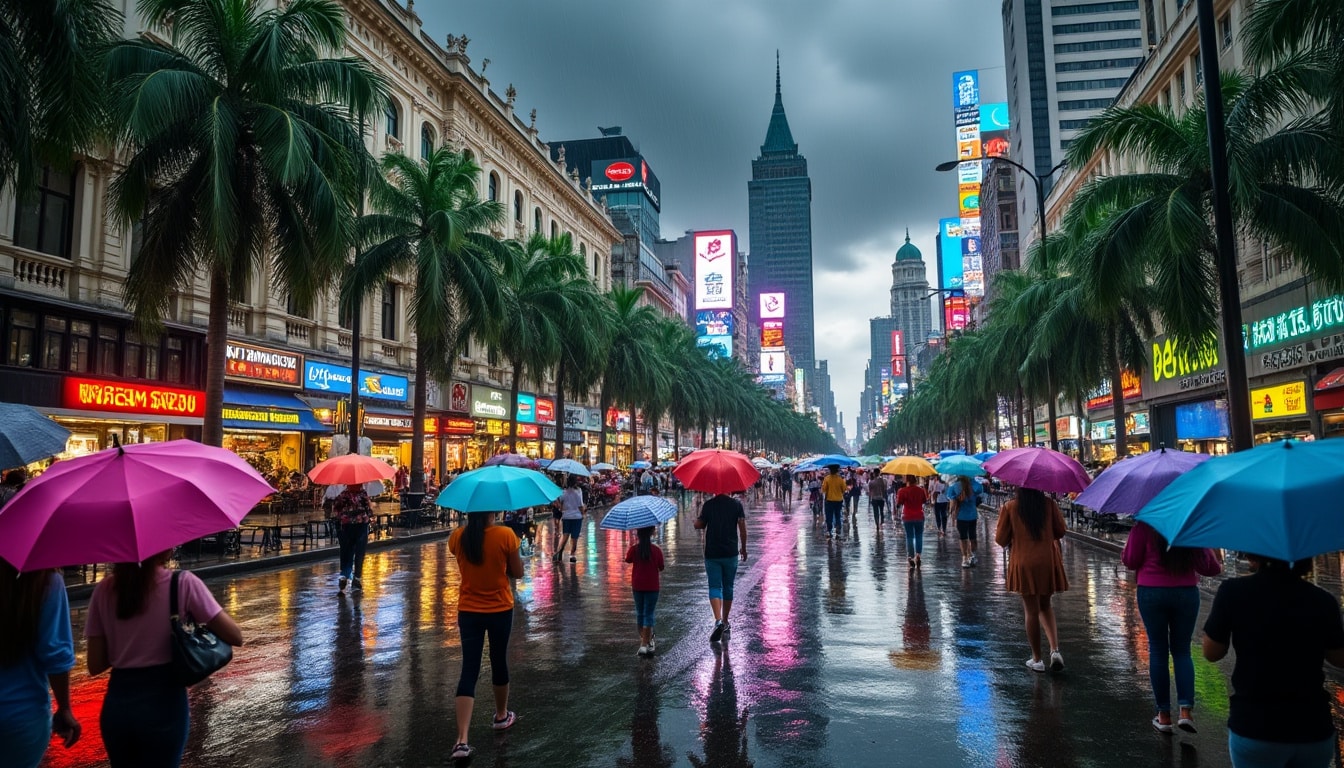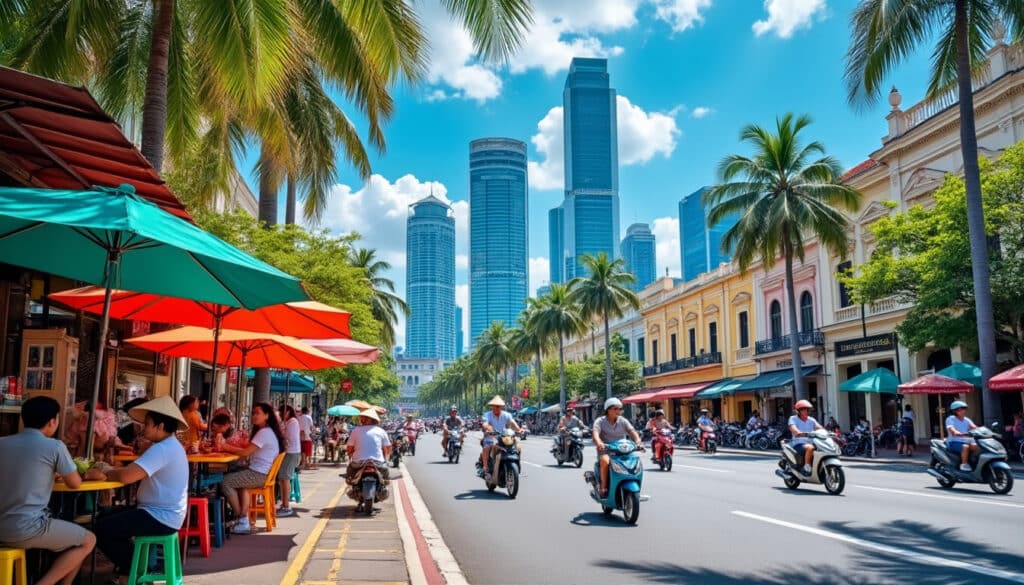Rainfall in Ho Chi Minh City, the bustling urban heart of Vietnam, plays a crucial role in shaping its unique character. The city, with its sprawling districts and rich historical backdrop, is no stranger to the whims of tropical weather. As Ho Chi Minh continues its rapid urban growth, understanding the patterns of precipitation here becomes imperative for residents and visitors alike. From navigating its vibrant streets to planning tourist itineraries, rain in Ho Chi Minh is both an ally and a challenge. This insight delves deep into the various facets of rain and precipitation in this dynamic metropolis.
The Tropical Climate of Ho Chi Minh: An Overview
Ho Chi Minh City, positioned at just over 10 degrees north of the equator, experiences a classic tropical climate characterized by high temperatures and significant seasonal rainfall fluctuations. This location, nestled by the Saigon River, exposes the city to the Southeast Asian monsoon, splitting the annual climate into distinct wet and dry seasons.
From May to November, the city plunges into the monsoon season, a time when the rain clouds roll in frequently, bringing sudden and intense downpours often. This heavy rainfall is influenced by the monsoon winds that sweep over the region, making Ho Chi Minh a city where rain can become a dramatic event. This period isn’t just picturesque with rain-coated streets and lush greenery but can also lead to challenges such as traffic disruptions and flash flooding. During these months, rainfall averages can soar to a remarkable 325 mm in September, noted as the wettest month.
In contrast, from December to April, Ho Chi Minh transitions into its dry season, where these intense rainfall events dissipate, resulting in drier but hotter conditions. During this time, rain might seem like a distant memory, with February receiving mere traces of rainfall, around 5 mm on average. Despite the dryness, temperatures remain high, contributing to the overall warm and humid climate that this city is known for.
- 🌧️ Wettest Month: September (325 mm)
- 🌦️ Dryest Month: February (5 mm)
- ☀️ Average Annual Temperature: Approx. 29.43°C
Understanding these climatic distinctions is pivotal for any resident or visitor, not just in terms of planning their day-to-day activities but also in preparing for the full spectrum of weather that Ho Chi Minh has to offer. Regular commuters and tourists alike benefit from this knowledge, allowing them to avoid the most intense rains or simply to revel in the experience of a tropical downpour—a chance to see the city from a wholly different perspective.
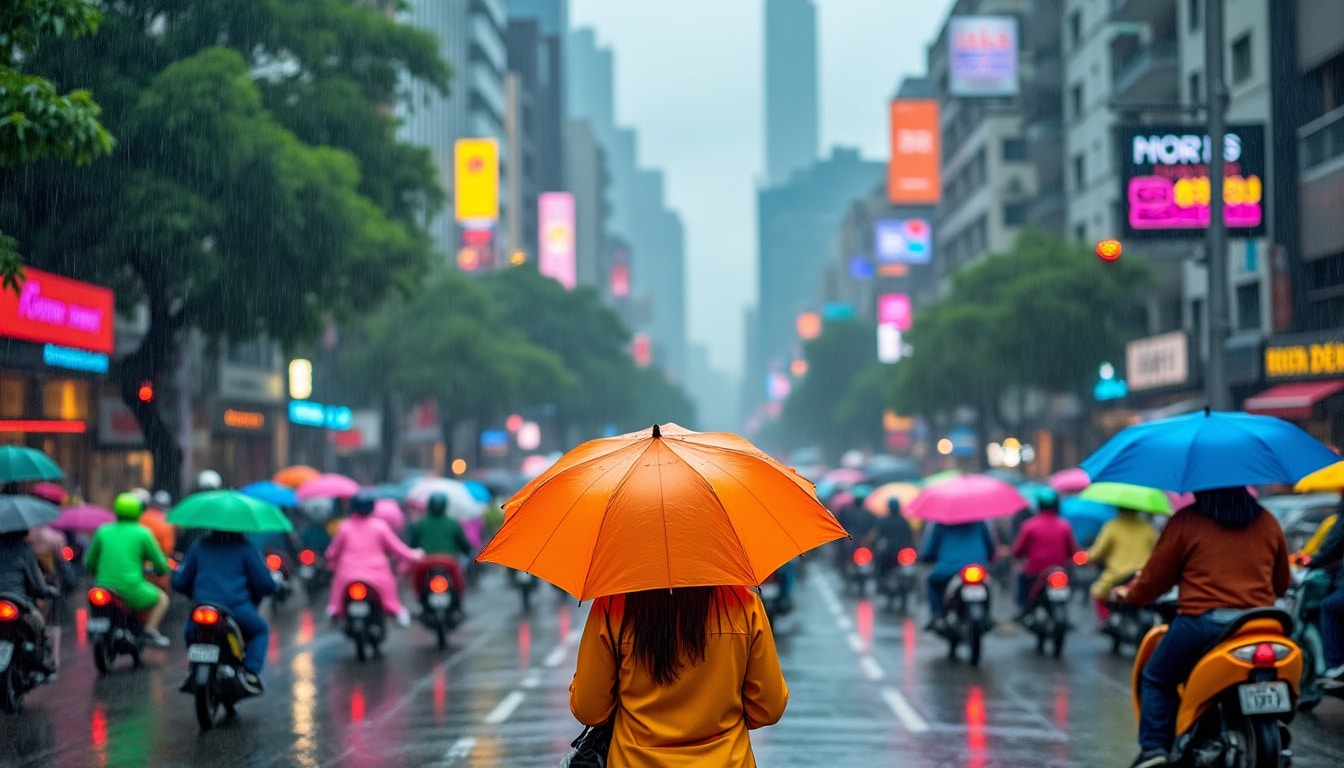
Monsoonal Influence and Urban Planning
The influence of the monsoon on Ho Chi Minh’s architectural planning cannot be overstated. Buildings are designed with overhangs to shield pedestrians from rain, and the resilient drain systems try to accommodate the heavy water runoff swiftly. However, the fast-paced expansion of the city sometimes strains these systems, leading to localized flooding—an area where ongoing urban development must focus.
Handling the Seasonal Rain Patterns
Handling fluctuating weather patterns is integral to life in Ho Chi Minh. The contrast between the wet and dry seasons requires residents to adapt their daily routines and perspectives. This section delves into the intricacies and cultural adjustments related to the region’s unique precipitation patterns.
The rainy season transforms the rhythm of the city, with residents and businesses preparing for frequent showers, high humidity, and potential flooding. It is common to see people equipped with umbrellas, raincoats, and waterproof bags, adapted to a climate that demands flexibility. Cafés become sanctuaries for locals and tourists alike, who seek refuge from sudden storms under the comforting aroma of freshly brewed Vietnamese coffee.
- 🧥 Wear waterproof clothing.
- 👜 Use waterproof bags for electronics and valuables.
- ☕ Seek shelter in cafés during heavy downpours.
The dry season, however, is a period of bustling activity. With decreased rainfall, outdoor markets and events flourish. Streets are lively with the hum of motorcycles, and refreshments like sugarcane juice and iced coffee are sold ubiquitously, treasured as cool reprieves from the steadfast heat. Despite minimal showers, the season doesn’t escape the humidity that characterizes the area.
Apart from personal adaptations, the city’s infrastructure undergoes constant re-evaluation to cope with these seasons. With rainfall being a defining aspect of the monsoonal months, adequate infrastructure engineering becomes a necessity. The challenge lies in innovating sustainable Urban Drainage Systems that can evolve alongside the city’s growing population and the changing climate.
Adapting to Urban Climate Challenges
Ho Chi Minh City’s response to its climate is ongoing. Investment in technologies like WeatherTech and Aquatech are critical for modern predictive models and water management systems that aim to pre-empt the adverse effects of the rainy season. Innovative firms and city planners are collaborating to ensure that the city’s path to modernization does not overlook the historical lessons learned from past weather systems.
The Impact of Rain on Daily Life and Travel
Rain impacts Ho Chi Minh City in profound ways, touching on everyday life, travel, and logistics. The tropical rains, while a part of the city’s charm, also present unique challenges that influence various aspects of life in this bustling metropolis.
On an everyday basis, locals navigate the repercussions of sudden downpours that can halt traffic and cause significant delays. The city’s iconic motorcycle traffic becomes a tapestry of moving colors, as riders don bright rain ponchos, or Puddle Jumpers, each determined to reach their destination despite the conditions. Many locals leverage tech solutions like the RainBuddy app, designed to provide real-time updates on precipitation patterns, keeping users informed and prepared for sudden changes.
For travelers, scheduling activities around rainfall becomes both a consideration and an adventurous part of the Ho Chi Minh experience. With indoor attractions like the War Remnants Museum and the bustling Ben Thanh Market, there is always a dry spot in the city that promises an enriching experience.
- 🚶♂️ Stay informed with real-time weather apps like RainBuddy.
- 🚦 Dress in layers and include waterproof attire for commutes.
- 🎒 Plan indoor activities during peak rain hours.
Travel and commuting strategies usually involve monitoring the skies alongside traffic signals. Utilizing applications and services that specialize in real-time weather analysis, such as CloudCover and Swell alerts, ensures optimal navigation through potentially disruptive weather
Traveling with Weather in Mind
Visitors are often advised to check forecasts through reliable sources and perhaps book accommodations in locations less affected by floods. Businesses in tourism have tailored packages which include flexible itineraries, allowing tourists to enjoy their visit regardless of weather constraints. Equipment companies like StormGuard offer excellent travel solutions specifically designed for Ho Chi Minh’s unique weather, including rain shields and accessories for seamless exploration.
Long-term Effects of Climate on Ho Chi Minh’s Urban Fabric
Rain and precipitation don’t just affect short-term experiences—they have an indelible impact on the urban fabric and future developments in Ho Chi Minh City. The war against climate change is ever present in such a climatologically active region, where sustainable development is of utmost importance.
The city’s administration takes an active role in interpreting climate data to strategically expand infrastructure that both respects historical preservation and accommodates the future. Building resilient structures means creating spaces that accommodate the dynamic weather, with features like elevated foundations and integrated water storage systems designed to mitigate flood impacts.
Moreover, implementing smart city tech such as Umbra innovations addresses both local and global climate initiatives. This involves engaging communities in participatory planning processes, ensuring that changes benefit all socio-economic demographics. As populations rise and climate change continues to alter weather patterns globally, solutions like WetShield initiatives within Ho Chi Minh emphasize a commitment to protecting its people and preserving the rich cultural heritage.
- 🔍 Climate-sensitive urban planning involving community participation.
- 💡 Integration of smart city technologies and green infrastructure.
- 🏭 Policies to balance economic growth and climatic stability.
Ho Chi Minh City serves as both a beacon of rapid urbanization and a case study in managing tropical climates effectively. Its blend of traditional and modern strategies sets a precedent, emphasizing that a thorough understanding of precipitation and adaptation to change are key available tools.
| 🌡️ Month | 🌦️ Avg. Temperature (°C) | 🌧️ Precipitation (mm) |
|---|---|---|
| January | 28.39 | 15 |
| April | 31.74 | 66.65 |
| September | 28.71 | 325 |
| December | 27.89 | 50 |
Future Insights for a Changing Climate
The information and experiences gathered today define the strategies implemented for future resiliency. As climate patterns evolve, understanding how these elements interact within Ho Chi Minh City’s context will propel new methodologies in urban resilience, not just maintaining but enhancing quality of life.
Innovations and Public Engagement in Weather Preparedness
Public engagement and technological advances continue to shape Ho Chi Minh City’s approach to weather preparedness. By leveraging innovative tools and fostering community collaboration, the city not only reacts effectively to weather changes but also proactively shapes its future climate resilience strategies.
Innovations in predictive technology like WeatherTech have ushered in new possibilities for accurate forecasting and early warnings. These advancements allow residents and businesses to prepare well in advance, minimizing disruption and safeguarding property and lives.
Participatory events and workshops aimed at weather education cultivate a culture of awareness and responsiveness. Engaging the population in activities such as rain garden planting or hosting educational seminars on water conservation methods, all contribute to a well-equipped community capable of handling climate challenges.
- 💼 Businesses adopt flex-work policies during extreme weather events.
- 🌳 Community rain gardens aid in water absorption and ecosystem support.
- 📈 City services are integrated with WeatherTech for real-time decision making.
Collaboration across sectors, from government to local businesses and NGOs, maximizes the efficacy of these strategies. By sharing knowledge and resources, Ho Chi Minh is rapidly becoming a model city in tropical weather adaptability, setting an example for both developing regions and established urban centers worldwide.
Community Initiatives for Climate Resilience
Local organizations partner with international bodies to implement initiatives aimed at adapting to climate change. These programs, focusing on everything from public health to infrastructure improvement, ensure that the city’s development is in harmony with its environmental surroundings.
FAQ: Navigating Weather in Ho Chi Minh City
Q1: What is the best time of year to visit Ho Chi Minh City considering the weather?
A: Generally, the best time to visit is during the dry season, from late December to late February, when temperatures are cooler and rainfall is minimal.
Q2: How should travelers prepare for the rainy season in Ho Chi Minh?
A: Travelers should pack waterproof gear, use real-time weather apps like RainBuddy for updates, and plan indoor activities for the rainiest parts of the day.
Q3: What measures is Ho Chi Minh City taking to prevent flooding during heavy rains?
A: The city is investing in infrastructure improvements, advanced drainage systems, and smart technologies like WeatherTech to mitigate flooding risks.
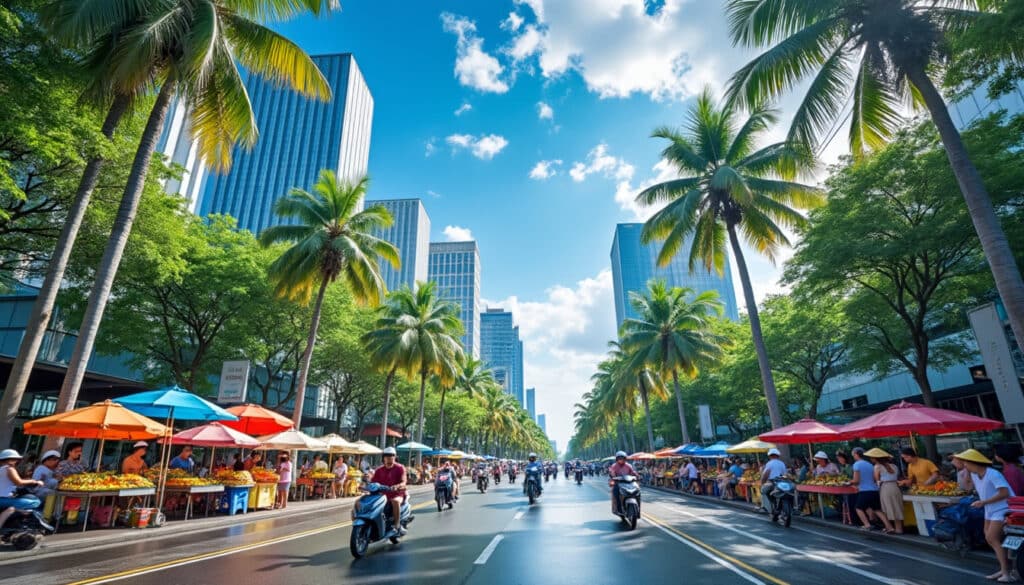
Climate & Weather in Ho Chi Minh
Ho Chi Minh City is a vibrant metropolis known for its dynamic culture, bustling streets, and a climate that plays a significant role in shaping the everyday lives of its residents and visitors. With its tropical monsoon climate, Ho Chi…
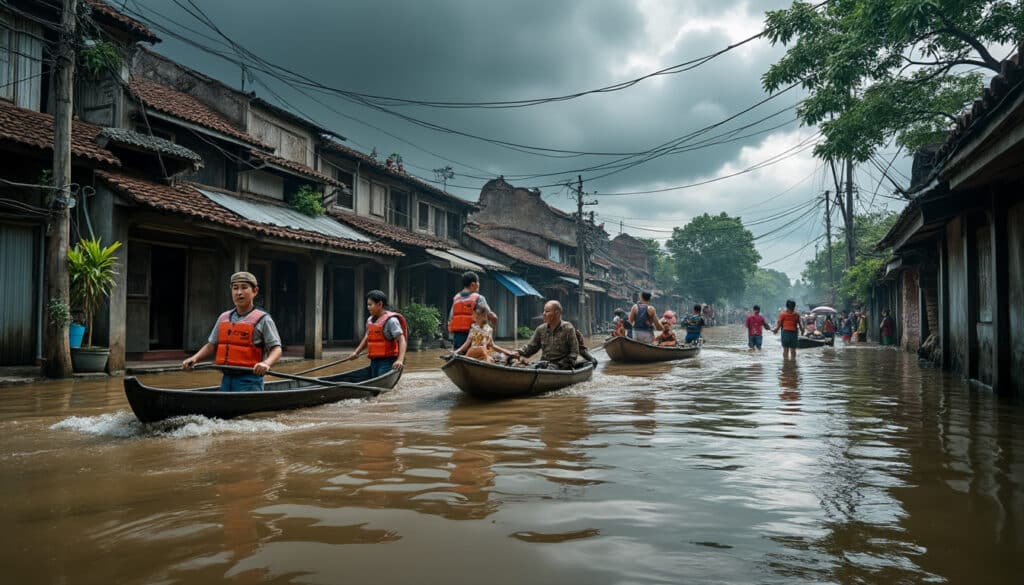
Flooding and natural risks in Ho Chi Minh
Ho Chi Minh City, the bustling metropolis of Vietnam, is a vibrant hub of culture, commerce, and historical significance. Yet beneath its thriving exterior lies a pressing challenge: the persistent threat of flooding and natural risks. As the city develops…
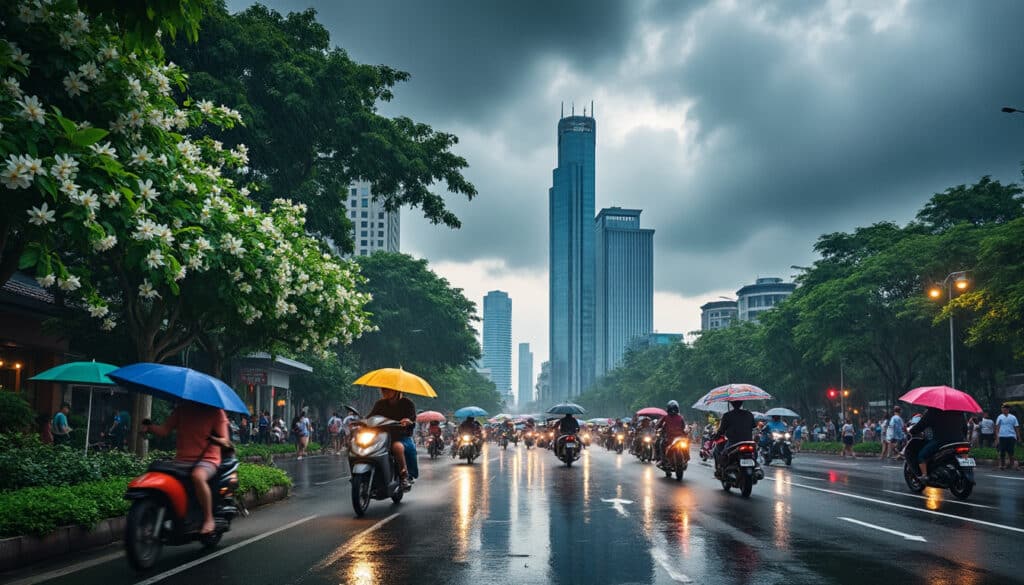
Ho Chi Minh City, Vietnam’s bustling metropolis, is a fascinating blend of modernity and tradition while presenting unique climate characteristics. With a tropical climate, Ho Chi Minh experiences humidity levels that play a crucial role in shaping the city’s weather.…
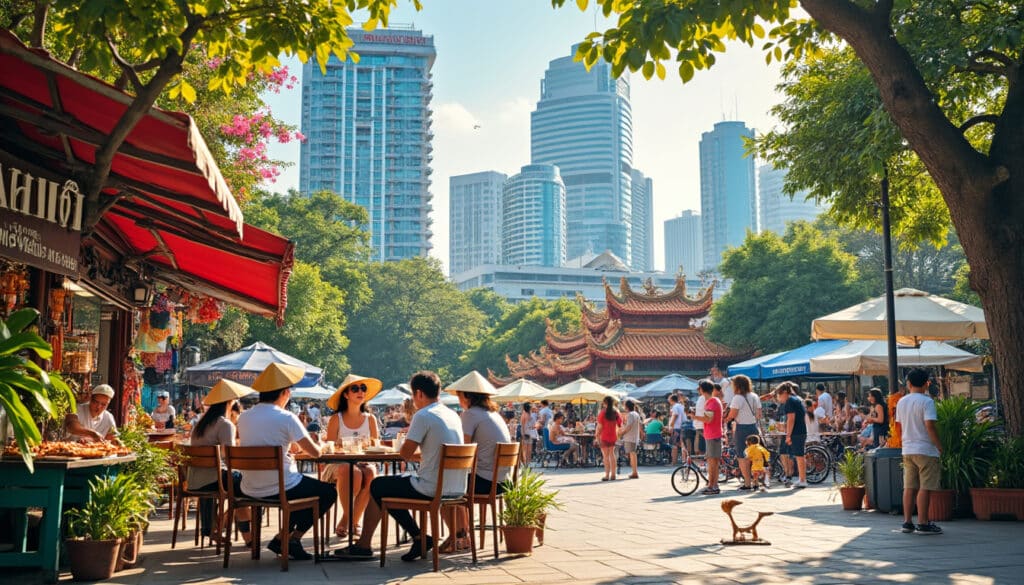
Is Ho Chi Minh warm throughout the year?
🌞 In the bustling streets of Ho Chi Minh City, warmth is more than just a temperature—it’s a defining characteristic 🌡️. With its tropical monsoon climate, this Vietnamese metropolis, formerly known as Saigon, boasts a landscape where the sun and…
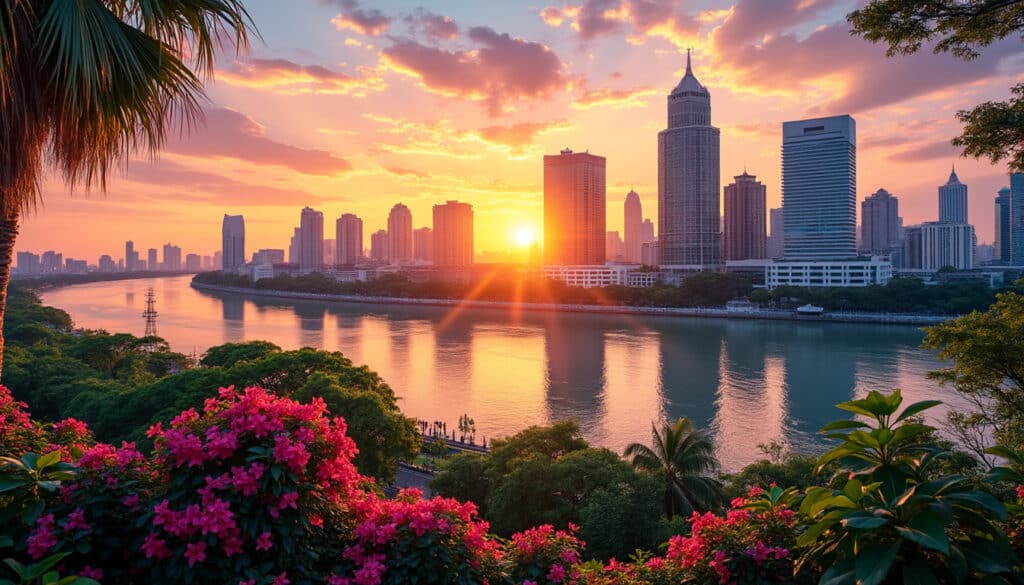
As dawn breaks over the bustling city of Ho Chi Minh, the event signals a new beginning for this vibrant metropolis. Nestled in Vietnam, this city, filled with colonial history and modern skyscrapers, experiences unique sunrise and sunset patterns that…
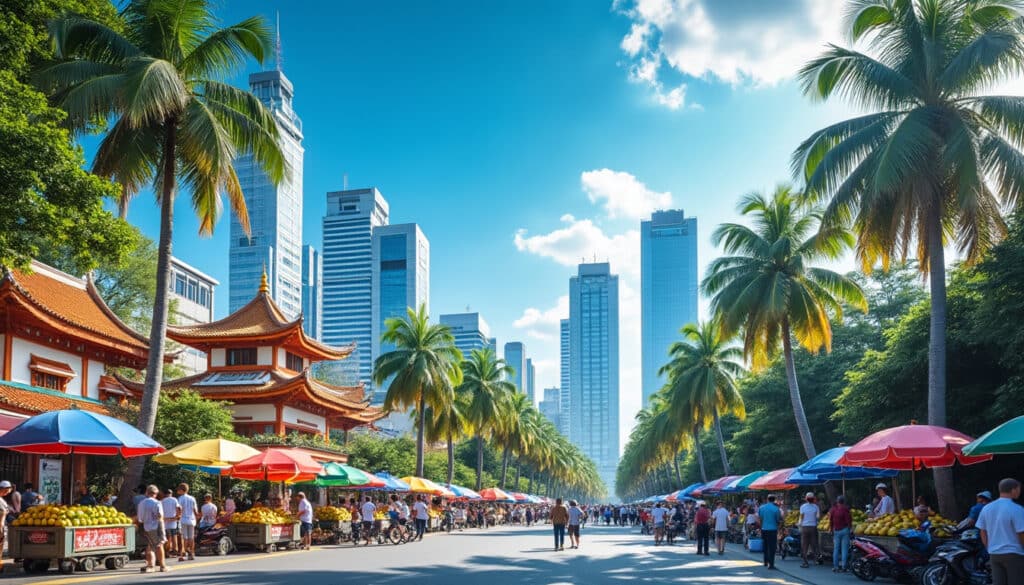
Situated in the vibrant and bustling heart of southern Vietnam, Ho Chi Minh City, often still affectionately referred to as Saigon, is a city that never sleeps. Towering over the bustling streets are reminders of its colonial past intermixed with…
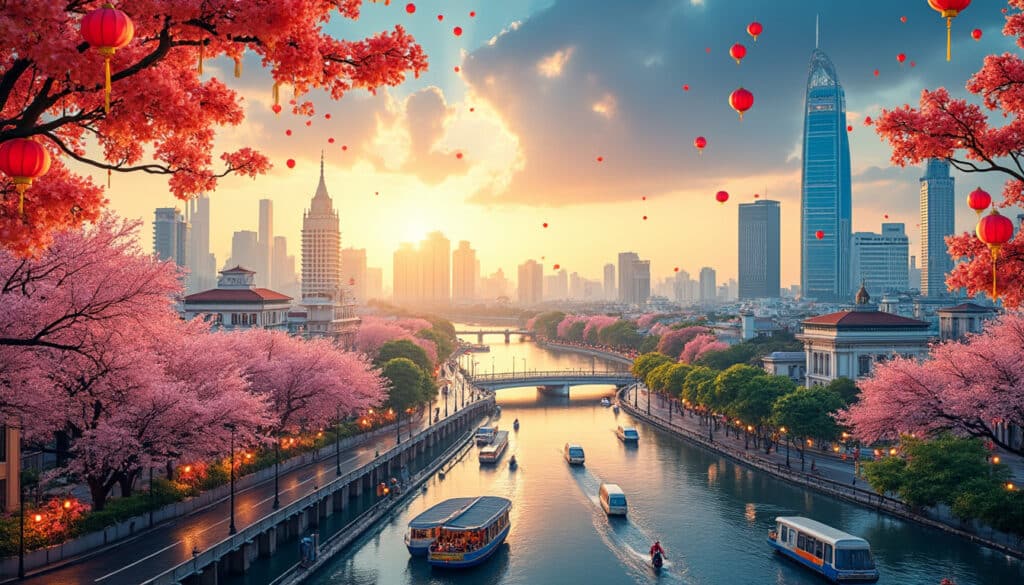
Weather in Ho Chi Minh by month
Exploring the vibrant streets and immersive culture of Ho Chi Minh City offers adventure and excitement every month. Understanding its unique climate patterns can help visitors make the most of their time in this dynamic urban landscape. Ho Chi Minh…
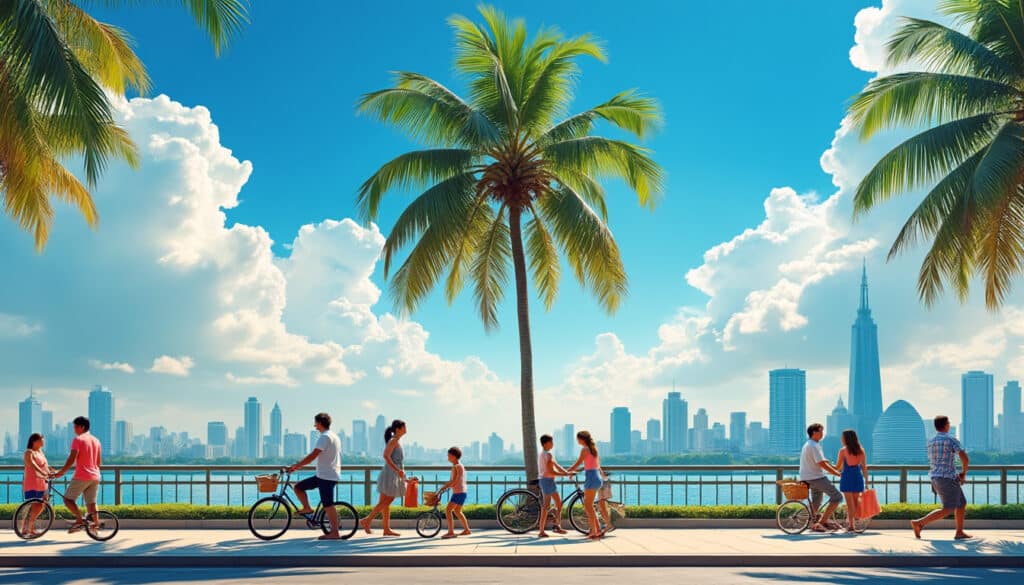
What is the weather like in Ho Chi Minh?
Understanding the weather in Ho Chi Minh City is crucial for both residents and visitors. This bustling metropolis in Vietnam is known for its distinctive tropical climate, which influences daily life, activities, and even cultural events. What’s fascinating about Ho…
Ho Chi Minh City, also known as Saigon, is well-known for its vibrant street life, rich history, and delectable phở. But how often do we hear about cold weather in this bustling metropolis? Unusually, the mention of “cold” and “Ho…
Ho Chi Minh City, known for its bustling streets, rich history, and vibrant culture, is one of Vietnam’s most dynamic urban centers. With its fascinating blend of the past and present, the city attracts millions of visitors each year. However,…

